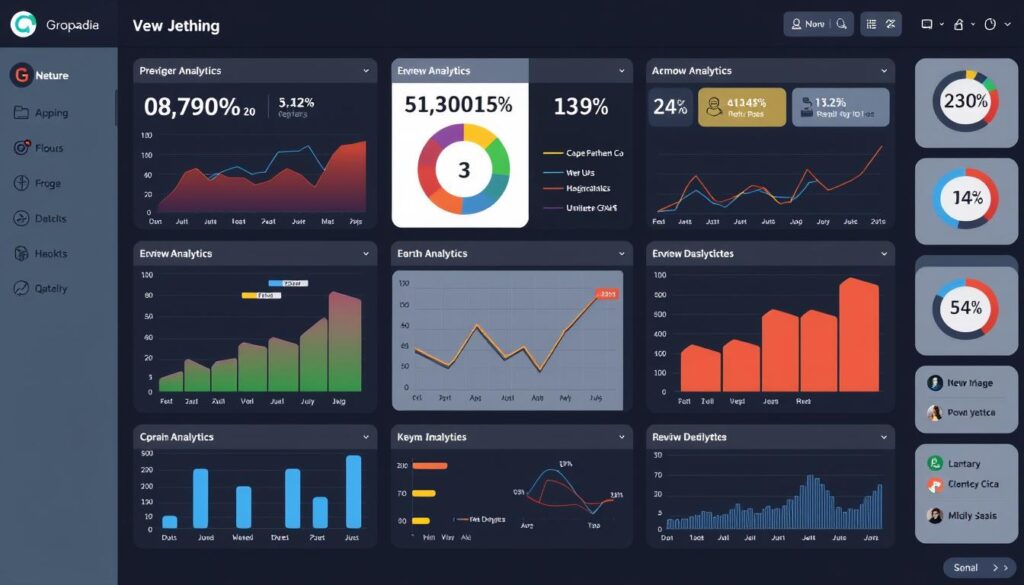In today’s digital landscape, your online reputation is crucial to attracting and retaining customers.
With over 93% of consumers reading reviews before making a purchase, it’s clear that your business’s reputation can significantly impact your bottom line.
Effective review management can help you build trust, improve search engine rankings, and increase customer loyalty. But how do you get started?
Key Takeaways
- Understand the importance of online reviews in today’s digital age.
- Learn how to monitor and respond to customer feedback effectively.
- Discover strategies to leverage positive reviews and improve your brand’s reputation.
- Identify tools and techniques to develop a robust review management strategy.
- Improve your online presence and attract more customers.
The Power of Customer Reviews in Today’s Digital Landscape
In today’s digital age, customer reviews have become a crucial factor in shaping consumer decisions and influencing online reputation. Customer reviews are not just feedback; they are also a powerful SEO tool. Consumer reviews are like fresh user-generated content which, when shared on the website and social media, can signal Google that your webpage is active and relevant.
How Reviews Shape Consumer Decisions
Reviews play a significant role in shaping consumer decisions. They provide potential customers with insights into the quality of a product or service, helping them make informed purchasing decisions. Positive reviews can enhance a business’s reputation, while negative reviews can deter potential customers. As such, managing customer reviews effectively is crucial for maintaining a positive online presence.
According to recent studies, a significant majority of consumers trust online reviews as much as personal recommendations. This underscores the importance of having a robust review management strategy in place.
The Impact of Reviews on Search Engine Rankings
The impact of customer reviews on search engine rankings is multifaceted. Reviews generate fresh, keyword-rich content that search engines value when determining page rankings. Moreover, reviews like Google reviews contribute to a business’s visibility in local search results. Search engines like Google have evolved to incorporate review signals into their ranking algorithms, making review management a critical component of SEO.
By understanding how review quantity, quality, diversity, and recency contribute to improved local SEO performance and visibility, businesses can leverage customer reviews to enhance their online presence and drive more traffic to their website.
Understanding Online Reputation Management
In the age of social media, managing your online reputation is not just about mitigating negative feedback but also about leveraging positive reviews. Your brand’s online presence is a critical factor in shaping consumer trust and perception.
What Constitutes Your Online Reputation
Your online reputation is constituted by various elements, including customer reviews, social media comments, and overall online sentiment. Positive reviews and feedback play a crucial role in building trust with potential customers. When customers search for your brand, the information they find influences their opinion about your business.
The table below highlights key factors that contribute to your online reputation:
| Factor | Impact on Reputation |
|---|---|
| Customer Reviews | Directly influences trust and perception |
| Social Media Comments | Shapes public opinion and brand awareness |
| Online Sentiment | Affects overall brand perception |
The Connection Between Reviews and Brand Perception
The connection between customer reviews and brand perception is significant. Reviews serve as powerful narratives that shape public perception of your brand’s values, reliability, and quality. Consistent themes in reviews, whether positive or negative, gradually form lasting impressions that can be challenging to change.
Furthermore, the sentiment expressed in reviews directly impacts your brand equity. Positive reviews can become valuable brand assets, reinforcing your intended brand messaging and aligning with customer experience.
Why Managing Customer Reviews is Essential for Business Success
Businesses that prioritise customer review management are more likely to experience sustained growth and improved brand perception. A strong online reputation is crucial in today’s digital landscape, directly influencing consumer decisions and ultimately, your bottom line.

Building Consumer Trust Through Review Management
Effective review management helps build consumer trust, a critical component for any successful business. By actively managing customer reviews, you demonstrate a commitment to customer satisfaction and transparency. This not only enhances your online reputation but also fosters loyalty among your customers.
- Discover the correlation between review management and key business metrics such as conversion rates and customer lifetime value.
- Learn how businesses with higher star ratings can command premium pricing due to increased customer trust.
- Understand the cost-saving benefits of effective review management, including reduced customer acquisition costs.
The Financial Impact of a Strong Online Reputation
A strong online reputation has a significant financial impact on your business. It can boost sales, attract top talent, and open doors to new partnerships. Companies with good reputations are more likely to see higher profits as the customer journey is largely pre-converted through positive reviews.
By investing in review management, you can improve your brand perception, reduce return rates, and ultimately drive business success. Positive reviews set accurate expectations, leading to more satisfied customers, while negative reviews provide valuable feedback for improvement.
Setting Up a Comprehensive Review Monitoring System
Establishing a robust review monitoring system is crucial for businesses to maintain a positive online reputation. This involves identifying the right platforms where your customers are leaving reviews and utilising the appropriate tools to track and manage these reviews efficiently.
Identifying Key Review Platforms for Your Business
To start, you need to identify the key review platforms relevant to your business. This could include social media sites like Facebook, review sites such as Google Reviews, or industry-specific platforms. Understanding where your customers are reviewing your business is crucial for effective review management.
Tools for Tracking Reviews Across Multiple Platforms
Various tools are available to help you track reviews across multiple platforms. For instance, SocialPilot Reviews is an intuitive platform that allows businesses to collect, manage, and respond to customer reviews efficiently. It streamlines review generation with automated email and SMS campaigns, enabling you to engage customers at the perfect time.
When selecting a tool, consider features such as real-time alerts, sentiment analysis, response management, and reporting capabilities. These features can significantly enhance your ability to manage reviews and maintain a strong online reputation.
![]()
By setting up a comprehensive review monitoring system, you can ensure that no review goes unnoticed, regardless of where it appears online. This proactive approach to review management not only enhances your online reputation but also fosters trust with your customers.
How to Manage Customer Reviews Online Reputation Effectively
To effectively manage your customer reviews and online reputation, you need a comprehensive strategy in place. This involves understanding the importance of customer feedback and how it impacts your business.
Creating a Review Management Strategy
Developing a review management strategy is crucial for maintaining a positive online reputation. This strategy should include creating a policy for responding to adverse customer reviews and designating an individual to serve as the spokesperson in these circumstances. By using customer review software, you can streamline the process of generating and managing online reviews.
Common features of review management software include:
- Collection of online reviews
- Multi-platform integration
- Response management
- Review display
- Sentiment analysis
When creating your strategy, consider the optimal organizational structure for review management based on your business size, industry, and available resources.
| Business Size | Ideal Review Management Structure |
|---|---|
| Small | Dedicated team member |
| Medium | Distributed team approach |
| Large | Dedicated reputation management team |
Assigning Responsibility for Review Management
Assigning responsibility for review management is critical to ensuring that reviews are handled promptly and professionally. You’ll need to select team members with the right skills and temperament for handling different types of reviews and customer interactions.
Consider the following when assigning responsibilities:
- Team members’ skills and experience
- Training and guidelines for review management
- Clear accountability systems
As Forbes notes, “A well-managed online reputation can be a significant competitive advantage.” By implementing a robust review management strategy and assigning responsibility effectively, you can maintain a positive online reputation and drive business success.
“The key to successful review management is to be proactive and responsive to customer feedback.”
Best Practices for Responding to Positive Reviews
Positive reviews are a valuable asset for any business, and knowing how to respond to them is key to leveraging their full potential. Responding to positive reviews shows that you value your customers’ feedback and care about their experiences.
Crafting Personalised Responses
When responding to positive reviews, it’s essential to craft personalised messages that thank reviewers for taking the time to share their thoughts. You can highlight specific points they liked about your product or service, demonstrating that you’re actively listening to their feedback. For instance, you could say,“Thank you for your kind words about our customer service. We’re glad to hear that our team provided you with the support you needed.”This approach not only shows appreciation but also reinforces the positive aspects of your business.
Leveraging Positive Feedback for Marketing
You can also leverage positive feedback for marketing purposes by featuring great reviews on your website or in marketing materials. This builds trust with potential customers and creates a positive reputation for your brand. For example, you can create a table showcasing customer testimonials, highlighting the key benefits of your product or service.
| Customer Review | Key Benefits |
|---|---|
| “Excellent customer service!” | Responsive support team |
| “High-quality products!” | Reliable and durable |
By showcasing positive reviews in a structured format, you can effectively communicate the value of your brand to potential customers. As a business owner, you can use positive feedback to improve your business by looking for common themes in good reviews and thinking of ways to give back to customers or audiences.
Handling Negative Reviews Professionally
When managed correctly, negative reviews can become a valuable tool for building trust with your customers. Negative feedback, though undesirable, is an inevitable part of doing business online. The key is not to avoid negative reviews altogether but to handle them in a way that showcases your commitment to customer satisfaction and professionalism.

The Art of Constructive Responses
Crafting a response to a negative review requires a delicate balance between empathy and professionalism. Your response should acknowledge the customer’s concerns, apologise for any inconvenience caused, and offer a solution or compromise where possible. It’s essential to keep your responses concise and personalised, addressing the customer by name and referencing specific details from their review.
For instance, a simple response could be: “Dear [Customer’s Name], we apologise for the issue you experienced with [Product/Service]. We are committed to making it right and would like to discuss a resolution. Please contact us directly so we can address your concerns effectively.” This approach demonstrates that you value your customers’ feedback and are proactive in resolving issues.
Turning Negative Experiences into Positive Outcomes
Turning a negative review into a positive outcome is not just about resolving the issue at hand; it’s about showing potential customers that you are committed to continuous improvement. By engaging constructively with negative feedback, you can transform a dissatisfied customer into a loyal advocate. This process, often referred to as “review recovery,” involves not just resolving the customer’s issue but also following up to ensure they are satisfied with the outcome.
Moreover, analysing negative reviews can help identify recurring issues that may be affecting multiple customers. By addressing these patterns, businesses can implement meaningful operational improvements, turning negative experiences into opportunities for growth and development.
Encouraging More Customer Reviews
To boost your online reputation, it’s crucial to encourage more customer reviews. By doing so, you’ll not only enhance your business’s online presence but also build trust with potential customers. A well-managed review strategy can significantly impact your reputation management efforts.
Ethical Ways to Generate Reviews
Generating reviews ethically is vital to maintaining a positive online reputation. You can achieve this by providing exceptional customer service, ensuring that your customers have a memorable experience with your business. For more insights on the power of customer reviews, visit The Curious Academy. This approach encourages customers to share their positive experiences without feeling forced or manipulated.
Another ethical way to generate reviews is by engaging with your customers through various touchpoints, such as email or social media, and politely asking for their feedback. Make sure to time your requests appropriately, so you’re not interrupting their experience or overwhelming them with requests.
Creating a Review-Friendly Customer Experience
To create a review-friendly customer experience, focus on delivering exceptional service at every interaction. Train your staff to be attentive, helpful, and courteous, ensuring that every customer feels valued. By exceeding customer expectations, you’ll increase the likelihood of receiving positive reviews and enhancing your online reputation.
Consider identifying key moments in your customer journey where satisfaction is highest, and gently encourage feedback at these points. This could be after a successful purchase or a positive interaction with your customer support team. By doing so, you’ll not only boost your customer reviews but also demonstrate your commitment to their satisfaction.
Top Tools and Services for Online Review Management
To manage your online reputation, you need the right tools and services to monitor and improve your brand’s presence across various review platforms. Online reputation management tools are designed to help you achieve this by providing a comprehensive overview of your brand’s online presence.
Review Management Software Options
Review management software is a powerful tool that enables you to track reviews across multiple platforms, including social media and review sites. Some of the top review management software options in the UK include:
ReviewTrackers and Reputation Tracker are popular choices among businesses.

Professional Reputation Management Services
If you’re looking for expert guidance on managing your online reputation, consider hiring professional reputation management services. These services can help you handle complex reputation issues and provide strategic guidance on improving your brand’s online presence.
Some of the top online reputation management services in the UK offer a range of services, including review generation, crisis response, and full-service reputation management. When selecting a service provider, it’s essential to ask the right questions and be aware of any red flags.
When deciding between handling review management in-house or outsourcing it to a professional service, consider factors such as business complexity and resources. Establishing a productive working relationship with your chosen service provider is crucial, including setting clear communication protocols and performance measurement metrics.
Measuring the Success of Your Review Management Efforts
To gauge the effectiveness of your review management efforts, it’s crucial to implement a robust measurement system. By analyzing recurring themes in customer reviews, you can gain invaluable insights into your business performance. This data-driven approach empowers you to identify areas for improvement, refine your offerings, and enhance customer satisfaction.
Key Performance Indicators to Track
To measure the success of your review management strategy, focus on key performance indicators (KPIs) such as overall review sentiment, average review rating, and the number of reviews received over time. Tracking these metrics will help you understand the impact of your efforts on your online reputation. You can also monitor the response rate to reviews and the resolution rate of issues raised in negative reviews.
Using Analytics to Refine Your Strategy
Utilizing analytics tools, you can refine your review management strategy by identifying emerging trends and patterns in review content. Predictive analytics powered by AI can forecast potential reputation issues before they happen, allowing you to take proactive steps. By translating review analytics into strategic business decisions, you can drive meaningful improvements throughout your organization.
Advanced analytical approaches can help extract actionable insights from your review data. Conducting effective sentiment analysis goes beyond positive/negative classifications to understand emotional nuances in feedback. This enables you to create a feedback loop between your review analytics and operational teams, ensuring insights drive significant business growth.
Conclusion
By now, it’s clear that managing customer reviews is essential for shaping your brand’s reputation. In today’s digital age, online reviews are the lifeblood of any business, influencing purchasing decisions and driving growth.
Implementing a robust review management strategy allows you to harness the power of customer feedback to your advantage. Responding to reviews promptly and professionally is crucial, whether they’re positive or negative. By actively engaging with your customers, you can build trust and loyalty, ultimately improving your online reputation.
To elevate your business to new heights, make sure to prioritise review management and adapt these principles to your unique context. By doing so, you’ll be able to establish a strong brand presence and reap the long-term benefits of a well-managed online reputation.



